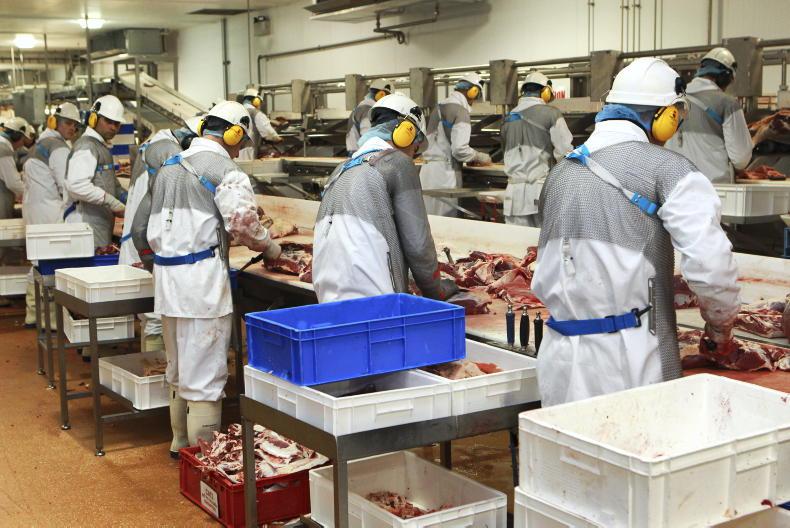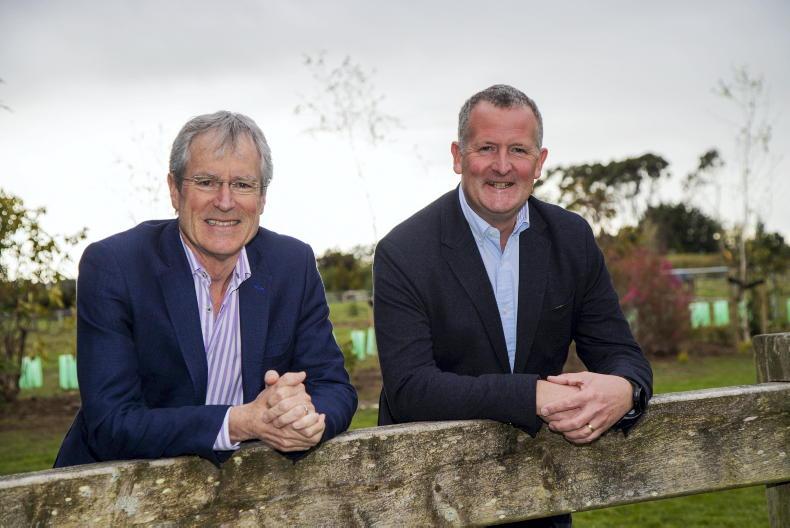After weeks of negotiation, ABP has concluded a deal with Scotbeef to acquire its Bridge of Allen abattoir and Queenslie packing factory, both located in central Scotland.
Scotbeef, which describes itself as “one of the UK’s largest privately owned fresh meat companies”, has other sites at Inverurie, East Kilbride, Heysham, Telford, Sheffield, Wolverhampton and Vivers Scotlamb that are not part of the deal.
ABP has said that it will assume control of the acquired sites at the end of July.
What does it mean for ABP?
ABP is already a huge business, primarily processing meat with a €5bn turnover and 13,000 staff spread over its 51 locations in Ireland, the UK and Europe. This acquisition further consolidates its position in Scotland where it already has a major beef processing factory in Perth, 50km east of the Scotbeef abattoir in Bridge of Allen.
ABP Group CEO Frank Stephenson said: “It will be very much business as usual with a commitment to building on Scotbeef’s well established tradition and reputation for high-quality Scottish red meat products.”
Processing capacity in Scotland doubled
The announcement that ABP is taking over Scotbeef’s Bridge of Allen and Queenslie sites from the end of July didn’t come as a surprise to anyone in the trade or farming organisations in Scotland. The deal will make ABP the dominant player in Scotland with capacity to handle up to 200,000 cattle annually, while the total Scottish factory kill is under 400,000 head annually.
In the acquisition of Scotbeef’s modern abattoir and retail packing facilities, ABP has acquired a prestigious player in the Scottish meat processing industry. It was owned by the Galloway family whose history goes back to 1888 and was the exclusive supplier of beef to Marks & Spencer for many years before being joined by Linden Foods which is also a relatively recent ABP acquisition.
Too big to be niche but not big enough
Despite being a major player in Scotland, Scotbeef was still exposed in the modern world of retail supply contracts that are tendered every couple of months.
A contract to supply a major supermarket or burger chain will require a huge proportion of a single factory site’s throughput.
This is fine as long as the work is there but if a tender is lost then a huge hole is left and production has to be sold on the open spot market.
This can be fine in a rising market but, equally, can be a disaster in a poor trade if cattle prices remain high.
The difference for large groups is that they will have a wider customer base and are better able to withstand the loss of a supply contract. They are also in a stronger negotiating position with their supermarket and burger chain customers given the volumes of product that they handle.
Marketing infrastructure
Larger groups also have the capacity to carry a bigger marketing infrastructure with offices in key international markets. These enable opportunities be identified and developed faster than small- or medium-sized (SMEs) companies who don’t have the capacity to carry the larger overheads.
Scotbeef is owned by the Galloway family who trace their history in the business back to opening a butcher shop in Glasgow in 1888 and by 1953 they had 54 shops spread across the west of Scotland. The Bridge of Allen abattoir was opened in 1981 and has been a key beef processor in the four decades since then, with a major upgrade done in 2001.
The 120,000 square foot retail packing facility at Queenslie was added in 2006. Scotbeef has been an anchor supplier of beef to Marks & Spencer in a trading relationship that goes back to the early 1960s.

Frank Stephenson, chief executive, ABP Group.
For a parallel in the Irish context, Scotbeef could be compared with Slaney Foods in that it is a large, standalone family business that was well regarded with a strong customer portfolio that included what would be considered elite customers.
Scottish farmers will judge the loss of an independent processor to a major factory group through the lens of beef price.
Scotland traditionally has the highest farm gate beef price in the UK and farmers will be watching if this premium continues in a new era when ABP has the largest share of the Scottish cattle kill.
The acquisition gives ABP the strongest presence in the Scottish market with the Bridge of Allen factory located 50km southwest of the ABP Perth site.
That means that an entirely new catchment area is opened up for ABP as farmers everywhere tend to default to their closest factory when killing cattle.
Major player
ABP is already a major player in the European beef processing industry with an annual turnover in excess of €5bn which includes their lamb and byproducts business as well.
This acquisition strengthens that position further though. While ABP is a major player in European beef processing it is much less so when compared with the South American giant JBS, with the equivalent of €72bn across its different operations and regions and the other major global players, Marfrig and Tyson Foods in the US.
That means that while ABP is massive in an Irish, British and even a European context, it is much less so when compared with the global giants.
ABP has landed what would be considered one of the jewels of the Scottish beef processing industry in Scotbeef.
Despite its longstanding supply of Marks & Spencer, Scotbeef like every other processor, was exposed to the tender process increasingly favoured by supermarket buyers.
Obviously, the owners decided they had enough at least for this part of their business and got into negotiations with ABP for whom the Scotbeef factories fit like a glove, just like the Linden and Slaney businesses.
As the map illustrates, ABP factories are spread across Britain and Ireland.
The latest acquisition further strengthens ABP’s already strong position in British beef processing. A further three factories were established in Poland over the past decade.
ABP acquires Scotbeef sites at the Bridge of Allen and Queenslie.Long established Scottish processor.Gives ABP capacity to handle half of Scottish beef kill.Similarities between Scotbeef and Slaney/Linden.Dawn Meats exits from Elivia
In the week that ABP made the agribusiness news for its latest acquisition, Dawn Meats was travelling in the opposite direction by announcing that it is selling its interest in Elivia, the French processor in which it had a minority shareholding with Terrena, a farmer-owned co-op which will now have 100% of the shares in the co-op.
Terrena is a co-op with 20,117 farmer members and their combined business interests give the co-op annual sales of €5.4bn and 12,336 employees.
This ends the joint venture which commenced in 2015 when Dawn acquired a 49% share of the second largest meat processor in France with an option of increasing this to 70% which was never taken up.
Elivia has annual sales of €930m, produces 162,000t of meat and employs 2,575 people.
The business is spread over 14 sites with 10 of these concentrated in the northwest of France. It is focused on beef processing, slaughtering 413,300 head of cattle along with 21,000 veal calves and 22,220 lambs in the company’s most recent data.
Reason
Niall Browne, Dawn’s CEO, said the reason for the exit was that “our vision for the French market and our ambition for the future strategic direction of Elivia is not aligned with that of our partner Terrena”.
Elivia was a loss-making business when Dawn became involved but has moved into profitability in recent years with the latest accounts for 2021 showing an operating profit of €18.2m.
Dawn had acquired an option to increase its stake in the business to 70% but while this was rolled over, it was never exercised.
Just as there was surprise back in 2015 when Dawn bought into a major French meat processor that was struggling commercially, it is also something of a surprise that it is moving out with the business now profitable.

Niall Browne, Dawn Meats.
Of course when a partner in a relationship has different ideas on how to move forward, a split can suit both parties.
The other big change in the intervening period is the Dawn acquisition of Dunbia. In this, it has greater capacity than Elivia as well as complete control.
Dawn has made it clear that while it may no longer be involved with Elivia, it will still be very much involved in supplying the French market from its Irish and UK factories.
Dawn had a significant presence in the French market before getting involved with Elivia, and no doubt will bring the knowledge and contacts picked up over the eight years of the joint venture into the core Dawn and Dunbia businesses.
After weeks of negotiation, ABP has concluded a deal with Scotbeef to acquire its Bridge of Allen abattoir and Queenslie packing factory, both located in central Scotland.
Scotbeef, which describes itself as “one of the UK’s largest privately owned fresh meat companies”, has other sites at Inverurie, East Kilbride, Heysham, Telford, Sheffield, Wolverhampton and Vivers Scotlamb that are not part of the deal.
ABP has said that it will assume control of the acquired sites at the end of July.
What does it mean for ABP?
ABP is already a huge business, primarily processing meat with a €5bn turnover and 13,000 staff spread over its 51 locations in Ireland, the UK and Europe. This acquisition further consolidates its position in Scotland where it already has a major beef processing factory in Perth, 50km east of the Scotbeef abattoir in Bridge of Allen.
ABP Group CEO Frank Stephenson said: “It will be very much business as usual with a commitment to building on Scotbeef’s well established tradition and reputation for high-quality Scottish red meat products.”
Processing capacity in Scotland doubled
The announcement that ABP is taking over Scotbeef’s Bridge of Allen and Queenslie sites from the end of July didn’t come as a surprise to anyone in the trade or farming organisations in Scotland. The deal will make ABP the dominant player in Scotland with capacity to handle up to 200,000 cattle annually, while the total Scottish factory kill is under 400,000 head annually.
In the acquisition of Scotbeef’s modern abattoir and retail packing facilities, ABP has acquired a prestigious player in the Scottish meat processing industry. It was owned by the Galloway family whose history goes back to 1888 and was the exclusive supplier of beef to Marks & Spencer for many years before being joined by Linden Foods which is also a relatively recent ABP acquisition.
Too big to be niche but not big enough
Despite being a major player in Scotland, Scotbeef was still exposed in the modern world of retail supply contracts that are tendered every couple of months.
A contract to supply a major supermarket or burger chain will require a huge proportion of a single factory site’s throughput.
This is fine as long as the work is there but if a tender is lost then a huge hole is left and production has to be sold on the open spot market.
This can be fine in a rising market but, equally, can be a disaster in a poor trade if cattle prices remain high.
The difference for large groups is that they will have a wider customer base and are better able to withstand the loss of a supply contract. They are also in a stronger negotiating position with their supermarket and burger chain customers given the volumes of product that they handle.
Marketing infrastructure
Larger groups also have the capacity to carry a bigger marketing infrastructure with offices in key international markets. These enable opportunities be identified and developed faster than small- or medium-sized (SMEs) companies who don’t have the capacity to carry the larger overheads.
Scotbeef is owned by the Galloway family who trace their history in the business back to opening a butcher shop in Glasgow in 1888 and by 1953 they had 54 shops spread across the west of Scotland. The Bridge of Allen abattoir was opened in 1981 and has been a key beef processor in the four decades since then, with a major upgrade done in 2001.
The 120,000 square foot retail packing facility at Queenslie was added in 2006. Scotbeef has been an anchor supplier of beef to Marks & Spencer in a trading relationship that goes back to the early 1960s.

Frank Stephenson, chief executive, ABP Group.
For a parallel in the Irish context, Scotbeef could be compared with Slaney Foods in that it is a large, standalone family business that was well regarded with a strong customer portfolio that included what would be considered elite customers.
Scottish farmers will judge the loss of an independent processor to a major factory group through the lens of beef price.
Scotland traditionally has the highest farm gate beef price in the UK and farmers will be watching if this premium continues in a new era when ABP has the largest share of the Scottish cattle kill.
The acquisition gives ABP the strongest presence in the Scottish market with the Bridge of Allen factory located 50km southwest of the ABP Perth site.
That means that an entirely new catchment area is opened up for ABP as farmers everywhere tend to default to their closest factory when killing cattle.
Major player
ABP is already a major player in the European beef processing industry with an annual turnover in excess of €5bn which includes their lamb and byproducts business as well.
This acquisition strengthens that position further though. While ABP is a major player in European beef processing it is much less so when compared with the South American giant JBS, with the equivalent of €72bn across its different operations and regions and the other major global players, Marfrig and Tyson Foods in the US.
That means that while ABP is massive in an Irish, British and even a European context, it is much less so when compared with the global giants.
ABP has landed what would be considered one of the jewels of the Scottish beef processing industry in Scotbeef.
Despite its longstanding supply of Marks & Spencer, Scotbeef like every other processor, was exposed to the tender process increasingly favoured by supermarket buyers.
Obviously, the owners decided they had enough at least for this part of their business and got into negotiations with ABP for whom the Scotbeef factories fit like a glove, just like the Linden and Slaney businesses.
As the map illustrates, ABP factories are spread across Britain and Ireland.
The latest acquisition further strengthens ABP’s already strong position in British beef processing. A further three factories were established in Poland over the past decade.
ABP acquires Scotbeef sites at the Bridge of Allen and Queenslie.Long established Scottish processor.Gives ABP capacity to handle half of Scottish beef kill.Similarities between Scotbeef and Slaney/Linden.Dawn Meats exits from Elivia
In the week that ABP made the agribusiness news for its latest acquisition, Dawn Meats was travelling in the opposite direction by announcing that it is selling its interest in Elivia, the French processor in which it had a minority shareholding with Terrena, a farmer-owned co-op which will now have 100% of the shares in the co-op.
Terrena is a co-op with 20,117 farmer members and their combined business interests give the co-op annual sales of €5.4bn and 12,336 employees.
This ends the joint venture which commenced in 2015 when Dawn acquired a 49% share of the second largest meat processor in France with an option of increasing this to 70% which was never taken up.
Elivia has annual sales of €930m, produces 162,000t of meat and employs 2,575 people.
The business is spread over 14 sites with 10 of these concentrated in the northwest of France. It is focused on beef processing, slaughtering 413,300 head of cattle along with 21,000 veal calves and 22,220 lambs in the company’s most recent data.
Reason
Niall Browne, Dawn’s CEO, said the reason for the exit was that “our vision for the French market and our ambition for the future strategic direction of Elivia is not aligned with that of our partner Terrena”.
Elivia was a loss-making business when Dawn became involved but has moved into profitability in recent years with the latest accounts for 2021 showing an operating profit of €18.2m.
Dawn had acquired an option to increase its stake in the business to 70% but while this was rolled over, it was never exercised.
Just as there was surprise back in 2015 when Dawn bought into a major French meat processor that was struggling commercially, it is also something of a surprise that it is moving out with the business now profitable.

Niall Browne, Dawn Meats.
Of course when a partner in a relationship has different ideas on how to move forward, a split can suit both parties.
The other big change in the intervening period is the Dawn acquisition of Dunbia. In this, it has greater capacity than Elivia as well as complete control.
Dawn has made it clear that while it may no longer be involved with Elivia, it will still be very much involved in supplying the French market from its Irish and UK factories.
Dawn had a significant presence in the French market before getting involved with Elivia, and no doubt will bring the knowledge and contacts picked up over the eight years of the joint venture into the core Dawn and Dunbia businesses.










SHARING OPTIONS